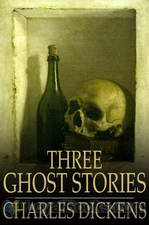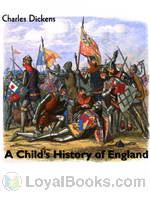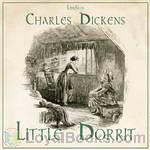|
Books Should Be Free Loyal Books Free Public Domain Audiobooks & eBook Downloads |
|
|
Books Should Be Free Loyal Books Free Public Domain Audiobooks & eBook Downloads |
|
Author Collection |
|---|
By: Charles Dickens | |
|---|---|
 Great Expectations
Great Expectations
From the opening passage itself of Great Expectations by Charles Dickens, the reader is drawn into the world of the hero, Pip, who is at that time, seven years old. The author creates an unforgettable atmosphere: the gloom of the graveyard, the melancholy of the orphan boy, the mists rising over the marshes and the terrifying appearance of an escaped convict in chains. Told in first person (one of the only two books that Dickens used this form for, the other being David Copperfield) Great Expectations is a classic coming of age novel, in which we trace the growth and evolution of Pip or Philip Pirrip to give his full name... | |
 A Tale of Two Cities
A Tale of Two Cities
Its immortal opening lines, "It was the best of times, it was the worst of times..." set the stage for a sweeping narrative that combines drama, glory, honor, history, romance, brutality, sacrifice and resurrection. A Tale of Two Cities by Charles Dickens is one of the most widely read and famous works of historical fiction in the English language. Dickens had recently launched his magazine All the Year Round in 1859. In the same year, he began featuring A Tale of Two Cities in 31 weekly installments in his new magazine... | |
 A Christmas Carol
A Christmas Carol
“A squeezing, wrenching, grasping, biting, clutching, covetous old sinner” is hardly hero material, but this is exactly what makes A Christmas Carol by Charles Dickens such an unforgettable book and its hero, Ebenezer Scrooge such an extraordinarily enduring character. In the book's celebrated opening scene, on the night before Christmas the old miser Ebenezer Scrooge sits in his freezing cold counting house, oblivious to the discomfort of his shivering young assistant Bob Cratchit. Scrooge is unremittingly rude to relatives and visitors alike who drop in to convey their Christmas greetings or ask for a contribution to charity... | |
 Bleak House
Bleak House
Over twenty consecutive months, Charles Dickens enthralled readers with his monthly installments of the novel Bleak House, a complex and compelling portrayal of the English judicial system. Serialized in his own magazine, Household Words, between 1852 and 1853, the book is deemed to be his finest work and is his ninth novel. Using an innovative literary technique known as “free indirect discourse,” where the narrator himself speaks through the medium of one of his main characters, Dickens uses the heroine Esther Summerson and an unidentified narrator as the vehicle for his story... | |
 Our Mutual Friend
Our Mutual Friend
As the last published novel of a writer whose career spanned over a dozen novels, innumerable short stories, plays and nonfiction, Our Mutual Friend is indeed a great composition by Charles Dickens. Considered to be one of his most mature, insightful and refined works, Our Mutual Friend takes a long, hard look at what many Victorians loved but hated to admit they did—money. Dickens uses satire, irony, symbolism and biting wit to portray this unlovely picture of a society obsessed with material comforts and its hypocrisy about the means it uses to achieve its ends... | |
 The Life and Adventures of Martin Chuzzlewit
The Life and Adventures of Martin Chuzzlewit
Dickens thought it was “in a hundred points, immeasurably the best” of his stories. Yet it was also one of his greatest flops. Compared to his other novels, The Life and Adventures of Martin Chuzzlewit was a dismal failure in terms of sales and the main reason for Dickens falling out with his long term publisher Chapman & Hall. They invoked a penalty clause and demanded that he pay back a portion of the advance which he refused. Martin Chuzzlewit was also dimly received in Dickens friendly America... | |
 Three Ghost Stories
Three Ghost Stories
As a gifted writer with a strong interest in supernatural phenomena, Charles Dickens produced a string of ghost stories with enduring charm. Three of them are presented here, of which The Signal Man is one of the best known. Though quite different from his most celebrated realistic and humorous critical novels, these ghost stories, Gothic and grotesque as they are, are of good portrayal, and worth a read/listen. Summary by Vivian Chan | |
 A Child's History of England
A Child's History of England
A Child’s History of England first appeared in serial form, running from January 25, 1851 to December 10, 1853 and was first published in three volume book form in 1852, 1853, and 1854. Dickens dedicated the book to “My own dear children, whom I hope it may help, bye and bye, to read with interest larger and better books on the same subject”. The history covered the period between 50 BC and 1689, ending with a chapter summarising events from then until the ascension of Queen Victoria. | |
 The Old Curiosity Shop
The Old Curiosity Shop
The fourth novel published by Charles Dickens, The Old Curiosity Shop was initially published in weekly installments between 1840 and 1841 and follows the poignant journey of the virtuous young girl Nell and her loving grandfather as they are forced to bear the hardships of life. Dickens cleverly employs contrasting eloquent characters as a utility to bring out the dissimilarity and injustice present in society. The novel introduces orphan Nell Trent and her grandfather, who live in a run-down store that is distinctive for its worthless bits and pieces... | |
 Little Dorrit
Little Dorrit
Originally published in monthly installments between 1855 and 1857, the novel focuses on the various forms of imprisonment, both physical and psychological, while also concentrating on dysfunctional family ties. Accordingly, Dickens avidly criticizes the social deficiencies of the time including injustice, social hypocrisy, the austerity of the Marshalsea debtors’ prison, and bureaucratic inefficiency. The novel kicks off with the introduction of William Dorrit, the oldest prisoner in the Marshalsea prison, who is also referred to as The Father of the Marshalsea... | |
 Nicholas Nickleby
Nicholas Nickleby
Nicholas Nickleby is a young Devonshire man of nineteen, handsome and hot headed, devoted to his sister Kate and his parents. Following the death of Nicholas’s father, they find themselves penniless, and travel to London to seek help from his uncle, Ralph Nickleby, a heartless, cunning rogue. He grudgingly finds employment for Nicholas in Dotheby Hall, a school in Yorkshire run by the brutal Mr. and Mrs. Wackford Squeers. Appalled at the condition and treatment of the school children, Nicholas rebels, escaping with Smike, a young man/child who has become devoted to him... | |
 The Strange Gentleman
The Strange Gentleman
Before he became a novelist, Dickens wrote several successful plays. This one from 1836, his first, he called, "A Comic Burletta in Two Acts". Characters arrive at a village inn called "The St. James Arms" and much confusion ensues. | |
 (Polish) Wigilja Bożego Narodzenia
(Polish) Wigilja Bożego Narodzenia
"Wigilja Bożego Narodzenia” jest wydanym w roku 1909 polskim przekładem opowiadania Karola Dickensa “A Christmas Carol” napisanym przez niego w roku 1843. Opowiada historiȩ nocy wigilijnej, w której wielkiego skąpca i samotnika, Ebenezera Scrooge, odwiedza pokutujący duch jego zmarłego wspólnika, ostrzegając go, że jeżeli nie zmieni sposobu życia, bȩdzie tak jak i on błąkał siȩ po śmierci okuty łańcuchami swoich win. Zapowiada wizyty trzech innych widm które ukazują Scrooge’owi wizje nocy wigilijnych z przeszłości, teraźniejszości i przyszłości. Jest to noc wielkich objawień, które na zawsze przemienią życie Scrooge’a." | |
 Oliver Twist (version 5 Dramatic Reading)
Oliver Twist (version 5 Dramatic Reading)
When orphaned Oliver Twist asks for more food, the workhouse board are horrified and immediately pack him off to work for an undertaker, who treats him badly. Oliver runs away and finds himself in the streets of London, where he meets the Artful Dodger and is lured into a gang of young pickpockets, led by the evil Fagin. Even amidst his horrible surroundings, Oliver escapes and finds his way into a loving home. But Fagin's gang are determined to steal him back to their life of crime, coming closer and closer... | |
 Oliver Twist (version 6)
Oliver Twist (version 6)
"Please sir, I want some more," the famous line spoken by Oliver Twist at age nine, becomes the tipping point of a huge change in Oliver's life. He is soon captured into the service of Fagin and his gang of pick-pocketing boys. But, Mr. Brownlow saves him from arrest, and for the first time in his young life Oliver finds comfort and caring. Unfortunately, he is recaptured into the seedy and disgusting world he had escaped, and meets with Bill Sykes, a dangerous criminal. There are numerous delightful or wicked characters that carry the story along, such as the Artful Dodger-- a boy of the streets under Fagin, Mr... | |